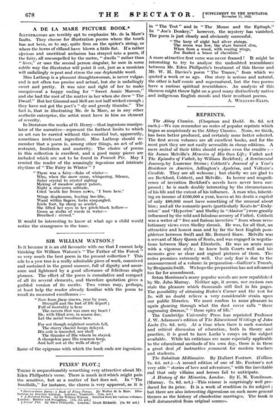PIXIES' PLOT.t THERE is unquestionably something very attractive about Mr.
Eden Phillpotts's verse. There is much in it which might pain the sensitive, but as a matter of fact does not. In " The Sandhills," for instance, the charm is very apparent, as it is
Down-a-down Derry; a Book of Fairy Poems. By Walter de Is Mare. Illus- trations by Dorothy Lathrop. London: Constable. 115s, net.] t A Hundred Poems. By Sir William Watson. Selected from his various volumes. London: Redder and- Stoughton_ Ms. 6d. netj Plof. By Eden Philipotta. London Grant Riciaids. Os. ed net.1
in " The Test " and in " The Mouse and the Epitaph." In " Joe's Donkey," however, the mystery has vanished.
The poem is just clearly and obviously successful.
" The harp of night had silver strings, The moon was low, the stars burned dim, When from a wood, with roaring wings, Joe flushed a brace of cherubim."
A more attractive first verse was never framed ! It might be interesting to try to analyse the undoubted resemblance between Mr. Eden Phillpotts's treatment of this theme and
Mr. W. H. Davies's poem " The Trance," from which we quoted a week or so ago. One story is serious and natural, the other is half comic and supernatural, but the two poems have a curious spiritual resemblance. An analysis of this likeness might throw light on a good many distinctively native and indigenous English moo& and their resultant poems.
A. WILLIAMS-ELLIS.


























































 Previous page
Previous page